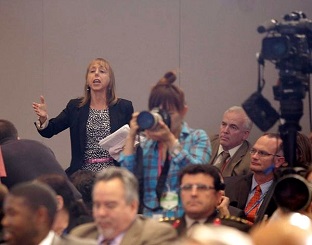Why I Spoke Out at Obama’s Foreign Policy Speech

CODEPINK founder Medea Benjamin interrupts Presi-
dent Barack Obama's national security speech, Thursday,
May 23, 2013, at the National Defense University at Fort
McNair in Washington.
Having worked for years on the issues of drones and Guantanamo, I was delighted to get a pass (the source will remain anonymous) to attend President Obama’s speech at the National Defense University. I had read many press reports anticipating what the President might say. There was much talk about major policy shifts that would include transparency with the public, new guidelines for the use of drones, taking lethal drones out of the purview of the CIA, and in the case of Guantanamo, invoking the “waiver system” to begin the transfer of prisoners already cleared for release.
Sitting at the back of the auditorium, I hung on every word the President said. I kept waiting to hear an announcement about changes that would represent a significant shift in policy. Unfortunately, I heard nice words, not the resetting of failed policies.
Instead of announcing the transfer of drone strikes from the CIA to the exclusive domain of the military, Obama never even mentioned the CIA—much less acknowledge the killing spree that the CIA has been carrying out in Pakistan during his administration. While there were predictions that he would declare an end to signature strikes, strikes based merely on suspicious behavior that have been responsible for so many civilian casualties, no such announcement was made.
The bulk of the president’s speech was devoted to justifying drone strikes. I was shocked when the President claimed that his administration did everything it could to capture suspects instead of killing them. That is just not true. Obama’s reliance on drones is precisely because he did not want to be bothered with capturing suspects and bringing them to trial. Take the case of 16-year-old Pakistani Tariz Aziz, who could have been picked up while attending a conference at a major hotel in the capital, Islamabad, but was instead killed by a drone strike, with his 12-year-old cousin, two days later. Or the drone strike that 23-year-old Yemini Farea al-Muslimi talked about when he testified in Congress. He said the man targeted in his village of Wessab was a man who everyone knew, who met regularly with government officials and who could have easily been brought in for questioning.
When the President was coming to the end of this speech, he started talking about Guantanamo. As he has done in the past, he stated his desire to close the prison, but blamed Congress. That’s when I felt compelled to speak out. With the men in Guantanamo on hunger strike, being brutally forced fed and bereft of all hope, I couldn’t let the President continue to act as if he were some helpless official at the mercy of Congress.
“Excuse me, Mr. President,” I said, “but you’re the Commander-in-Chief. You could close Guantanamo tomorrow and release the 86 prisoners who have been cleared for release.” We went on to have quite an exchange.
While I have received a deluge of support, there are others, including journalists, who have called me “rude.” But terrorizing villages with Hellfire missiles that vaporize innocent people is rude. Violating the sovereignty of nations like Pakistan is rude. Keeping 86 prisoners in Guantanamo long after they have been cleared for release is rude. Shoving feeding tubes down prisoners’ throats instead of giving them justice is certainly rude.
At one point during his speech, President Obama said that the deaths of innocent people from the drone attacks will haunt him as long as he lives. But he is still unwilling to acknowledge those deaths, apologize to the families, or compensate them. In Afghanistan, the US military has a policy of compensating the families of victims who they killed or wounded by mistake. It is not always done, and many families refuse to take the money, but at least it represents some accounting for taking the lives of innocent people. Why can’t the President set up a similar policy when drone strikes are used in countries with which we are not at war?
There are many things the President could and should have said, but he didn’t. So it is up to us to speak out.
___________________________________________________________________________________

Medea Benjamin is cofounder of the human rights group Global Exchange and the peace group CodePink. Her new book is Drone Warfare: Killing by Remote Control. She also is author of the Don’t Be Afraid Gringo: A Honduran Woman Speaks from the Heart. Please register here for the Drone Summit on April 28-29.
Medea Benjamin has been an advocate for social justice for more than 30 years. Described as "one of America’s most committed -- and most effective -- fighters for human rights" by New York Newsday, and called "one of the high profile leaders of the peace movement" by the Los Angeles Times, Medea has distinguished herself as an eloquent and energetic figure in the progressive movement. In 2005 she was one of 1,000 exemplary women from 140 countries nominated to receive the Nobel Peace Prize on behalf of the millions of women who do the essential work of peace worldwide. In 2010 she received the Martin Luther King, Jr. Peace Prize from the Fellowship of Reconciliation.
Since the September 11, 2001 tragedy, Medea has been working to promote a U.S. foreign policy that would respect human rights and gain us allies instead of contributing to violence and undermining our international reputation. In 2000, she was a Green Party candidate for the California Senate. During the 1990s, Medea focused her efforts on tackling the problem of unfair trade as promoted by the World Trade Organization. Widely credited as the woman who brought Nike to its knees and helped place the issue of sweatshops on the national agenda, Medea was a key player in the campaign that won a $20 million settlement from 27 US clothing retailers for the use of sweatshop labor in Saipan. She also pushed Starbucks and other companies to start carrying fair trade coffee.
Her work for justice in Israel/Palestine includes taking numerous delegations to Gaza after the 2008 Israeli invasion, organizing the Gaza Freedom March in 2010, participating in the Freedom Flotillas and opposing the policies of the Israel lobby group AIPAC. In 2011 she was in Tahrir Square during the Egyptian uprising and In 2012 she was part of a human rights delegation to Bahrain in support of democracy activists; she was tear-gassed, arrested and deported by the Bahraini government.
Her articles are published at CodePink and, of course, here.
___________________________________________________________________________________
Article also posted here: Antiwar.com. Photo: Pablo Martinez Monsivais
URL: http://www.a-w-i-p.com/index.php/2013/05/27/why-i-spoke-out-at
























